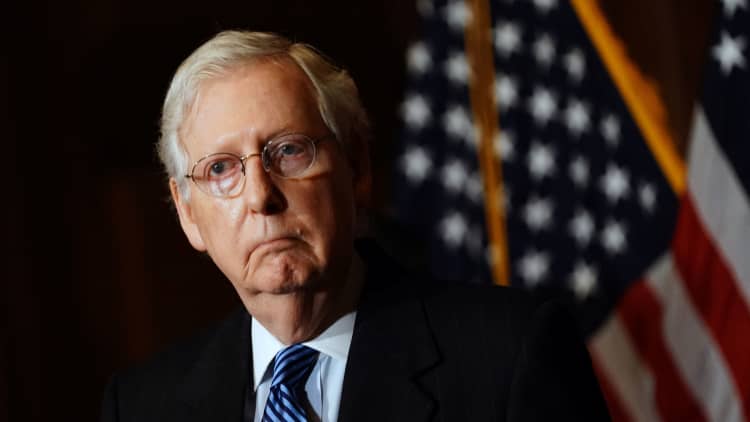Preparing for the first evenly split Senate in 20 years and the only impeachment trial for an ex-president in U.S. history, Senate leaders Chuck Schumer and Mitch McConnell met Tuesday to discuss ground rules for the chamber.
Leaving a roughly 30-minute meeting in McConnell's office, Schumer told reporters, "We discussed a whole lot of issues," according to NBC News. They did not make an immediate announcement on how they would proceed during the complicated early days of the Biden administration.
Schumer's Democrats are expected to take control of a 50-50 Senate on Wednesday. Kamala Harris will become vice president, then hold a tiebreaking vote once the chamber swears in three new Democratic senators. Harris' successor, Alex Padilla of California, and Senators-elect Raphael Warnock and Jon Ossoff of Georgia are set to be sworn in Wednesday.
Schumer, D-N.Y., and McConnell, R-Ky., have to decide how to handle an unprecedented few weeks for the Senate. The chamber needs to set rules for an impeachment trial of outgoing President Donald Trump, which Democrats aim to balance with the confirmation of President-elect Joe Biden's Cabinet and passage of a coronavirus relief bill.
Ahead of the meeting Tuesday, Schumer told reporters that "We've got three things we got to do, do quickly: impeachment, nominations, Covid." Speaking on the Senate floor, he described them as "essential items" the chamber has to check off its list in the coming weeks.
McConnell also spoke during the Senate session Tuesday and said Trump provoked the deadly Capitol riot.
He did not address the logistics of the trial and confirmation votes publicly, but did so in a Monday letter to the Senate GOP caucus obtained by NBC News.
The Senate will have to come to an agreement on how to structure a 50-50 split. Democrats will lead committees and Schumer will decide which bills see a floor vote. The party can confirm executive branch nominees with a simple majority and will need 60 votes to pass most legislation.
In the last evenly split Senate in 2001, each party had the same number of seats on committees. If a committee was deadlocked on a measure, the majority leader had the power to bring it to a full Senate vote.
The leaders have indicated the 2001 rules will guide the Senate setup for the next two years. In a letter to Republican senators on Monday night, McConnell said he hoped to follow the 2001 Senate power structure and added that he wanted to ensure the Senate keeps the "status quo" on the legislative filibuster. Some Democrats have pushed to scrap the practice and allow legislation to pass with a simple majority.
Failure to come to an accord on the filibuster could "delay" an agreement on the power structure and committee assignments, McConnell wrote.

The Senate cannot start Trump's trial until it receives from the House the impeachment article, which charges the president with inciting an insurrection at the Capitol on Jan. 6. House Speaker Nancy Pelosi, D-Calif., has not said when she will send the measure to the Senate.
Trump's first impeachment trial last year took about three weeks. If the needed 67 senators vote to convict the president, it would come too late to remove him from the White House. However, the chamber could hold a separate vote to bar Trump from holding office again.
Schumer and McConnell were expected to discuss how to structure the trial. Biden has said he hopes the Senate can devote part of its day to impeachment and another part to confirming his Cabinet.
In his letter, McConnell suggested the formal impeachment process should not start until Thursday because of Biden's inauguration on Wednesday, NBC reported.
Senate committees started to hold hearings for the president-elect's nominees on Tuesday. They include Treasury Secretary-designate Janet Yellen, Secretary of State nominee Antony Blinken and Defense Secretary-designate Lloyd Austin. Panels could vote to send their nominations to the Senate floor in the coming days.
Schumer noted that "it will take cooperation from our Republican colleagues to swiftly confirm" national security officials in Biden's administration. Sen. Josh Hawley, R-Mo., said Tuesday that he would block quick consideration of Homeland Security Secretary nominee Alejandro Mayorkas, delaying confirmation of at least one key official.
Still, McConnell told Republicans that the Senate could hold votes on advancing Biden nominees as soon as Wednesday, NBC reported.
Along with the trial and confirmations, the Senate will also likely consider pandemic aid in the coming weeks. Biden, Schumer and Pelosi have said another relief package will be their top legislative priority.
The president-elect last week released a $1.9 trillion aid plan, which he hopes will guide a bill Democrats try to push through Congress. Biden could face difficulties in winning Republican support for more federal spending after lawmakers approved a $900 billion aid package last month.


